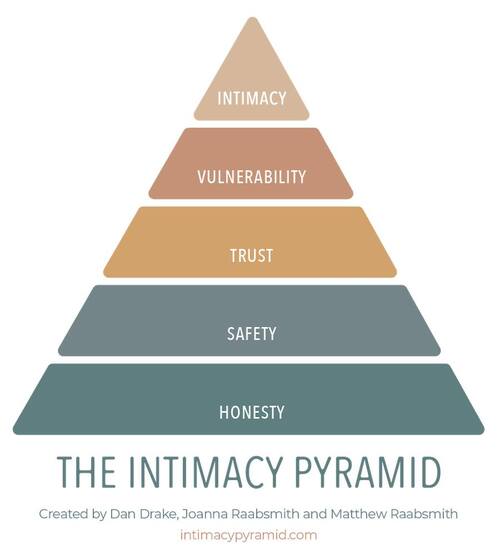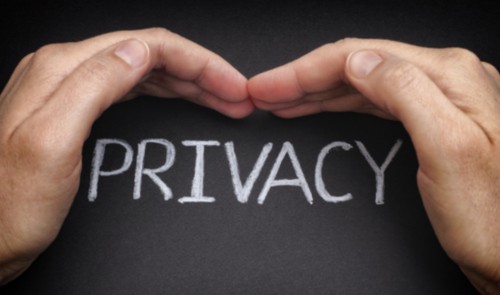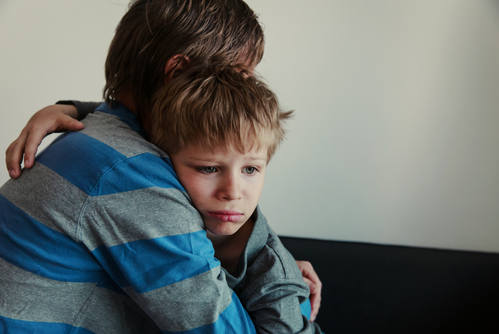I Have Just Found Out - What Do I Do Now?
If you have just found out that your partner uses pornography, has had an affair, uses prostitutes or any other sexual secrets, your world will most likely be rocked, like an earthquake has just hit, upending all you knew and shattering any trust; it’s a betrayal and we are so sorry that you are in this position.
Intimate relationships, (as you’ll see from this diagram) are built on honesty, shared truths, so when you discover that there have been secrets it makes sense that your whole relationship is shaken.
Intimate relationships, (as you’ll see from this diagram) are built on honesty, shared truths, so when you discover that there have been secrets it makes sense that your whole relationship is shaken.
The person who has hurt you is the very one who is meant to bring comfort to you, which leaves you feeling lost and not knowing where to turn. So, however you are feeling right now is understandable. We would love to support, pray for and journey alongside you at this time. We believe that there is hope for you and that God will draw alongside you, both now and into your future. Psalm 56 says, “For you have rescued me from death; you have kept my feet from slipping. So now I can walk in your presence, O God, in your life-giving light.” Even though you might find it hard to see or feel this at the moment, God is a God of healing and restoration and there is hope in Him.

Here are some helpful things we’d like you to know.
Takes Time

Healing from betrayal takes time, commonly the first 3 - 6 months (depending on the disclosure) is just a time of shock and the healing journey may begin after this. There is no formula or set time for healing whether you remain in your relationship or not. If you choose healing it will come, with inevitable setbacks and frustrations along the way but it will come. Be kind to yourself in this time of shock. We will have suggestions and support for you along the way.
Grief and Anger

In most instances people experience deep grief when betrayed. As with any grief you will face waves of emotion, and different emotions, this is very normal. It’s important to allow yourself to feel these emotions. One of those emotions may be anger, this is understandable, in these moments give yourself permission to walk away. For your wellbeing it is wise, if your anger becomes uncontrollable, to remove yourself from the situation and get professional support. Over time you may begin to feel a little better but then something happens, and you find yourself hit by another wave of emotion. This is normal but as you choose to heal this will pass.
If you are feeling suicidal, please get immediate help. Here are some helplines that you can contact...
Beyond Blue 1300 22 4636
Lifeline 13 11 14
MensLine Australia 1300 78 99 78
And please reach out to one of the Pastoral Team at New Community or a close support.
Beyond Blue 1300 22 4636
Lifeline 13 11 14
MensLine Australia 1300 78 99 78
And please reach out to one of the Pastoral Team at New Community or a close support.
It’s not your fault
It’s very common for people who have been sexually betrayed to believe that this must in some way be their fault. It’s not your fault, even if things are hard in your relationship there was still a choice by your partner to engage in these sexual behaviours. Each person is responsible before God for their own choice. It’s not your fault.
Many women received this false teaching...
Many women received this false teaching...
FALSE TEACHING
Moral Gatekeeper- It is your responsibility to keep your partner away from ‘sexual sin’.
If your partner looks for sexual pleasure elsewhere then you are not providing enough sex or being sexy enough.
THIS IS NOT TRUTH
Moral Gatekeeper- It is your responsibility to keep your partner away from ‘sexual sin’.
If your partner looks for sexual pleasure elsewhere then you are not providing enough sex or being sexy enough.
THIS IS NOT TRUTH
Men, if you have been betrayed, you may question yourself – did I do enough, was I enough? You may be left feeling emasculated. Your questions will particularly focus on whatever you have tied your masculinity to – did you not provide enough? was sex not good enough? did you not demonstrate your love enough? It is always important to be working on how we love others but even if things were difficult in your relationship your partners choice was their choice, it was not your fault.
The nature of the betrayal
The nature of the betrayal will be different for different individuals and situations. This information doesn’t excuse the choices made but as you understand more about the nature of betrayal it can help you understand, again, that it’s not your fault.
- For many, their sexual behaviours are unwanted and are a coping strategy for dealing with inner pain. When these people engage in sexual behaviours but don’t want to be doing so, they’re ashamed of it, and a cycle of behaviours and shame begins. To dull the pain, they turn again to sexual behaviours which bring momentary relief. The majority of unwanted sexual behaviours are not about sex; they’re a coping strategy.
“Emotional isolation, powerlessness, and stress are exactly the conditions that promote the neurobiology of addiction.” Dr. Gabor Maté
The majority of adults who engage in unwanted sexual behaviours were exposed to explicit sexual content when young.
- For others, they want to actively engage in these behaviours, and either are unaware that this would have an impact on you, or deceive themselves, minimising and justifying their actions, or, they are not concerned about the impact this has on you. When your partner is choosing to stay with you and is not concerned about the hurt this might cause you, their behaviour is narcissistic and comes from a hard heart.
- There are also occasions when people are manipulated into these behaviours. They have encountered people who have actively and intentionally chosen to seduce them, they may or may not have been engaged in any unwanted sexual behaviours beforehand. They have still chosen these behaviours in response, but didn’t go looking for them.
It is possible to see elements of your partner’s behaviour in 2 or 3 of these points, especially if they compartmentalise their life. It may also be that you don’t see these elements in your partner. Everyone’s story is different.
As stated above, these points don’t justify the behaviour but understanding the nature of the betrayal you have experienced, can shape the healing journey that you will go on.
As stated above, these points don’t justify the behaviour but understanding the nature of the betrayal you have experienced, can shape the healing journey that you will go on.
There’s likely to be more
If your partner tells you that their behaviour was a one-off thing, we’re incredibly sorry, but this is highly unlikely.
There is a lot of shame upon being found out and great fear of hurting or losing you and being found out for who they really are. It’s very natural for them to only tell partial truth. The aim of doing this is to protect, but actually this causes more harm.
Sadly, a common occurrence when betrayal has occurred is ‘trickle disclosure’ when over time more and more is revealed or found out and each time it is revealed you are told that that is all, that's everything. This causes greater harm, as whenever you find out something new, you experience that earthquake of betrayal again, any trust that has begun to build, is shattered all over again and hope of repair fades.
If we are able to work with your partner, we will help them to understand this. But if that isn’t possible it is worth explaining this to them – that although it will cause immense pain now, you’re already in a place of pain and it will do less damage and harm in the long run if you find it all out now.
There is a lot of shame upon being found out and great fear of hurting or losing you and being found out for who they really are. It’s very natural for them to only tell partial truth. The aim of doing this is to protect, but actually this causes more harm.
Sadly, a common occurrence when betrayal has occurred is ‘trickle disclosure’ when over time more and more is revealed or found out and each time it is revealed you are told that that is all, that's everything. This causes greater harm, as whenever you find out something new, you experience that earthquake of betrayal again, any trust that has begun to build, is shattered all over again and hope of repair fades.
If we are able to work with your partner, we will help them to understand this. But if that isn’t possible it is worth explaining this to them – that although it will cause immense pain now, you’re already in a place of pain and it will do less damage and harm in the long run if you find it all out now.
BUT WAIT!
When people have been engaging in unwanted sexual behaviour for a long time or it’s complex, they may compartmentalize their lives so not fully know all that they have done. So, DON’T RUSH this.
You can feel that you need to know everything now – this is understandable, you don’t know what the truth is anymore, and you want to know. BUT it is better to do this slowly with support. Talk this through with a trusted person or professional or spend time considering what you really want to know and what you don’t want to know. There is no bleach for the brain – you cannot unknow what you know, and some details are unhelpful to know for your future wellbeing. So please don’t rush. There are people we can recommend to help with this process of disclosure if it’s complex.
You can feel that you need to know everything now – this is understandable, you don’t know what the truth is anymore, and you want to know. BUT it is better to do this slowly with support. Talk this through with a trusted person or professional or spend time considering what you really want to know and what you don’t want to know. There is no bleach for the brain – you cannot unknow what you know, and some details are unhelpful to know for your future wellbeing. So please don’t rush. There are people we can recommend to help with this process of disclosure if it’s complex.
So, what can you do for yourself?
Mental and Physical Health
Your health matters, please continue to take care of yourself. It can be very helpful to talk with a counsellor or psychologist to help you process all that you are going through.
If there has been sexual activity with someone else, it is important to be aware of sexually transmitted diseases and worth getting checked out with your GP. Here is some helpful information - https://www.healthdirect.gov.au/sexually-transmitted-infections-sti
It is helpful to work out ways to use up the energy of anger as uncontrollable anger can lead you to do things that you will regret later on. For example, physical activity is very good for channelling the anger in a constructive way.
If there has been sexual activity with someone else, it is important to be aware of sexually transmitted diseases and worth getting checked out with your GP. Here is some helpful information - https://www.healthdirect.gov.au/sexually-transmitted-infections-sti
It is helpful to work out ways to use up the energy of anger as uncontrollable anger can lead you to do things that you will regret later on. For example, physical activity is very good for channelling the anger in a constructive way.

You may need to take time off work, or perhaps having work to focus on is a helpful distraction. It might however be a good idea to let someone at work know that you are dealing with some difficult personal circumstances and if your performance is affected then this is why. If your employer has access to EAP (Employee Assistance Program) this could be a worthwhile resource.
Memory or appetite might also be affected. You may need to set yourself reminders to eat and drink and try and do so in a nourishing way as best as you can.
Sleep is also highly likely to suffer. Speak to your GP, trial listening to things like sleep stories, guided prayer or meditation, progressive muscle relaxation, relaxing music etc.
You may not feel like doing these things but your health does matter.
Memory or appetite might also be affected. You may need to set yourself reminders to eat and drink and try and do so in a nourishing way as best as you can.
Sleep is also highly likely to suffer. Speak to your GP, trial listening to things like sleep stories, guided prayer or meditation, progressive muscle relaxation, relaxing music etc.
You may not feel like doing these things but your health does matter.
Are you safe?
Are you safe remaining in your home? If not...
If you are in immediate danger, call the police now 000.
Here are some organisations to contact...
If you are in immediate danger, call the police now 000.
Here are some organisations to contact...
SafeSteps – 1800 015 188 Crisis family violence support
1800RESPECT – 1800 737 732 Speak to a counsellor or get information about supports available, or how to support someone affected by family violence - broad support
The Orange Door - Intake and referral point for all family violence support in the local area. One in each region of Victoria.
Men's Line – 1300 789 978 Free online/phone counselling service to support men 24/7
1800RESPECT – 1800 737 732 Speak to a counsellor or get information about supports available, or how to support someone affected by family violence - broad support
The Orange Door - Intake and referral point for all family violence support in the local area. One in each region of Victoria.
Men's Line – 1300 789 978 Free online/phone counselling service to support men 24/7
Please contact one of the pastors at New Community or your support person for additional support.
Privacy

Sometimes in our anger and pain we want to hurt our partner, and we do this by telling lots of people. This may feel satisfying in the immediate but most likely isn’t helpful if after time you choose to work at repairing the relationship. Once people know, they can’t un-know.
Don’t rush into telling people but do talk to a couple of people, it’s helpful to have more than one support. It does matter that you have support. Choose wisely, you don’t owe it to anyone to tell them. We can help find people for you to talk with.
You may want to discuss with your partner who you will tell, they may bring some perspective to this, but it is up to you who you tell.
Boundaries
You are allowed to have boundaries - in fact it is wise to. These boundaries can be for a time while you process what has happened and what you need. You may need support in thinking these through and being able to put these in place. In the immediate you might want to think about...
- Where will you and your partner sleep?
- Do you want your partner to touch you?
- Do you want your partner to move out for a period of time,? or do you need to move out for a period of time?
- How will you keep yourself safe from learning details of your partner’s behaviour that won’t help you in the long term?
- Are there other boundaries that need to be established for privacy, safety or to address trust? Eg use of technology, interactions with others.
- See below for boundaries with regard to parenting.

Create Scripts
There will be times you are asked questions that can be hard to answer in the moment. It can be really helpful to think through what questions you might be asked and come up with some scripts, answers you can give. Ask one of your support people to help you come up with them.
Don’t rush into decision making

Contrary to popular belief the majority of couples, after sexual betrayal, remain together and work towards healing their relationship. Sometimes couples separate. In the early days of discovery we can react out of the immense pain caused, this is understandable, but it is not a time to make big decisions. These decisions need to be thought through carefully so don’t rush into making decisions. What you really want to do, will become clearer to you over time.
What about the kids?

Our children are often more aware of our emotions and situations than we think. It is important to think through how we care for them in this time. Our responses will differ depending on their ages and development as well as the situation. While honesty can be important in supporting your children, it is equally important to protect your child/ren from negative details of the relationship conflict. It is recommended you agree on parenting strategies during this time – including respecting each other’s privacy – whilst also respecting your child/ren’s right to a safe childhood. This can be hard to do when you have been betrayed, so it is best to use your adult personal and professional support people to talk to and process your emotions – not your children. You need to ensure that relationships with both parents are respected and not undermined. Please note, if there are safety concerns for your children, please seek professional support (as listed in “are you safe?” section).
Support
We would like to help and support you on your pathway to healing whether it’s just a listening ear, practical support, recommendations, or prayer support.
This free course is very helpful in the first week https://www.affairrecovery.com/surviving-infidelity/first-steps-bootcamp
We will be in touch and provide you with further information to help you navigate the next steps.
Ali Box and the Pathway to Healing Team
Please contact Ali Box ali@ncr.org.au 0432 098 302 for practical support
This free course is very helpful in the first week https://www.affairrecovery.com/surviving-infidelity/first-steps-bootcamp
We will be in touch and provide you with further information to help you navigate the next steps.
Ali Box and the Pathway to Healing Team
Please contact Ali Box ali@ncr.org.au 0432 098 302 for practical support
